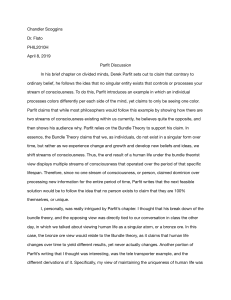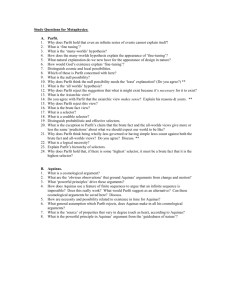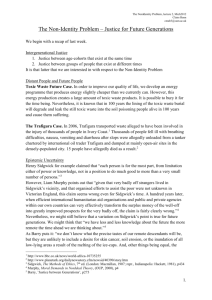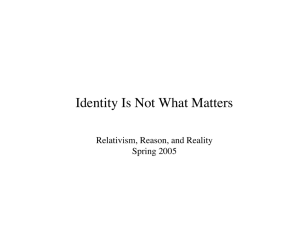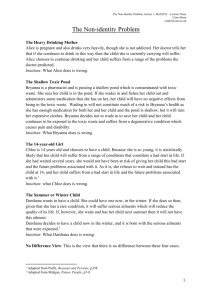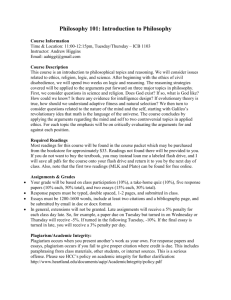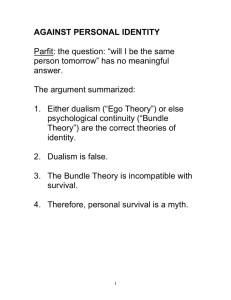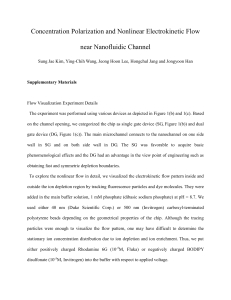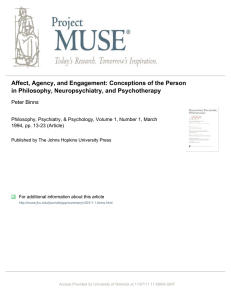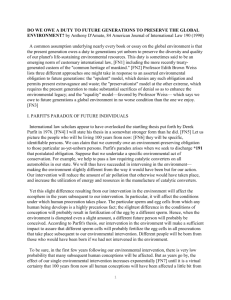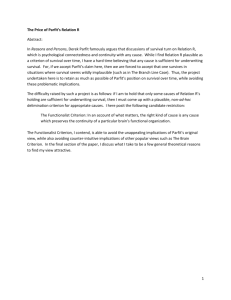Parfit NC - circuitdebater
advertisement
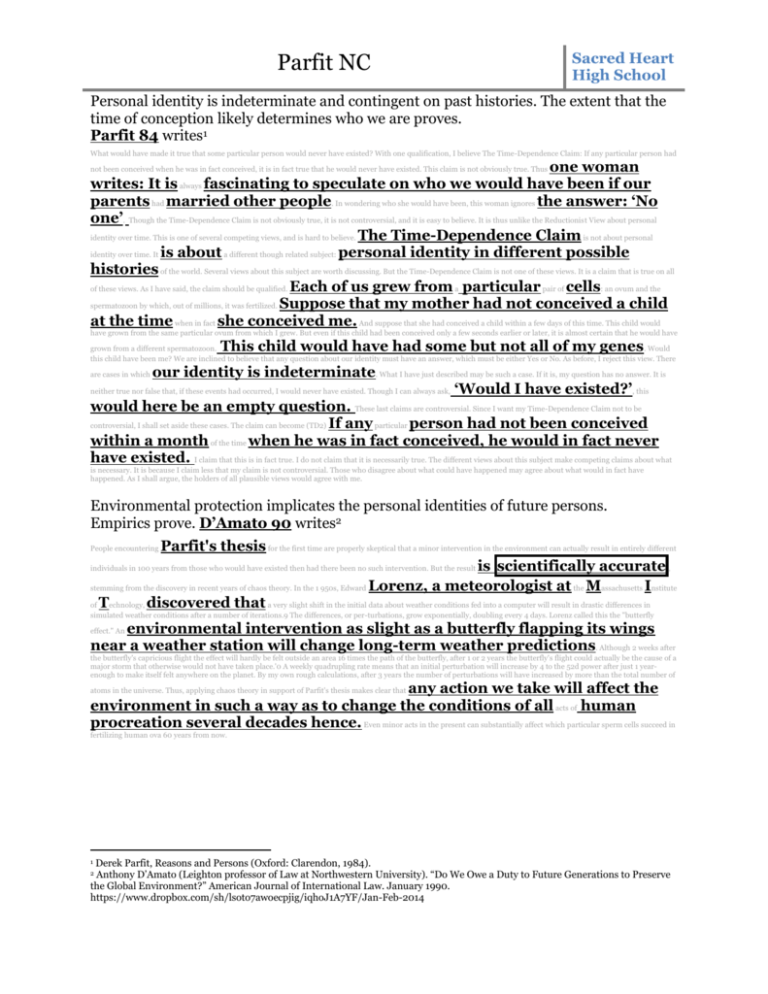
Parfit NC Sacred Heart High School Personal identity is indeterminate and contingent on past histories. The extent that the time of conception likely determines who we are proves. Parfit 84 writes1 What would have made it true that some particular person would never have existed? With one qualification, I believe The Time-Dependence Claim: If any particular person had one woman writes: It is always fascinating to speculate on who we would have been if our parents had married other people. In wondering who she would have been, this woman ignores the answer: ‘No one’. Though the Time-Dependence Claim is not obviously true, it is not controversial, and it is easy to believe. It is thus unlike the Reductionist View about personal identity over time. This is one of several competing views, and is hard to believe. The Time-Dependence Claim is not about personal identity over time. It is about a different though related subject: personal identity in different possible histories of the world. Several views about this subject are worth discussing. But the Time-Dependence Claim is not one of these views. It is a claim that is true on all of these views. As I have said, the claim should be qualified. Each of us grew from a particular pair of cells: an ovum and the spermatozoon by which, out of millions, it was fertilized. Suppose that my mother had not conceived a child at the time when in fact she conceived me. And suppose that she had conceived a child within a few days of this time. This child would not been conceived when he was in fact conceived, it is in fact true that he would never have existed. This claim is not obviously true. Thus have grown from the same particular ovum from which I grew. But even if this child had been conceived only a few seconds earlier or later, it is almost certain that he would have This child would have had some but not all of my genes grown from a different spermatozoon. . Would this child have been me? We are inclined to believe that any question about our identity must have an answer, which must be either Yes or No. As before, I reject this view. There our identity is indeterminate. What I have just described may be such a case. If it is, my question has no answer. It is ‘Would I have existed?’, this would here be an empty question. These last claims are controversial. Since I want my Time-Dependence Claim not to be controversial, I shall set aside these cases. The claim can become (TD2) If any particular person had not been conceived within a month of the time when he was in fact conceived, he would in fact never have existed. I claim that this is in fact true. I do not claim that it is necessarily true. The different views about this subject make competing claims about what are cases in which neither true nor false that, if these events had occurred, I would never have existed. Though I can always ask, is necessary. It is because I claim less that my claim is not controversial. Those who disagree about what could have happened may agree about what would in fact have happened. As I shall argue, the holders of all plausible views would agree with me. Environmental protection implicates the personal identities of future persons. Empirics prove. D’Amato 90 writes2 Parfit's thesis for the first time are properly skeptical that a minor intervention in the environment can actually result in entirely different individuals in 100 years from those who would have existed then had there been no such intervention. But the result is scientifically accurate , stemming from the discovery in recent years of chaos theory. In the 1 950s, Edward Lorenz, a meteorologist at the Massachusetts Institute of Technology, discovered that a very slight shift in the initial data about weather conditions fed into a computer will result in drastic differences in People encountering simulated weather conditions after a number of iterations.9 The differences, or per-turbations, grow exponentially, doubling every 4 days. Lorenz called this the "butterfly environmental intervention as slight as a butterfly flapping its wings near a weather station will change long-term weather predictions. Although 2 weeks after effect." An the butterfly's capricious flight the effect will hardly be felt outside an area 16 times the path of the butterfly, after 1 or 2 years the butterfly's flight could actually be the cause of a major storm that otherwise would not have taken place.'0 A weekly quadrupling rate means that an initial perturbation will increase by 4 to the 52d power after just 1 yearenough to make itself felt anywhere on the planet. By my own rough calculations, after 3 years the number of perturbations will have increased by more than the total number of any action we take will affect the environment in such a way as to change the conditions of all acts of human procreation several decades hence. Even minor acts in the present can substantially affect which particular sperm cells succeed in atoms in the universe. Thus, applying chaos theory in support of Parfit's thesis makes clear that fertilizing human ova 60 years from now. Derek Parfit, Reasons and Persons (Oxford: Clarendon, 1984). Anthony D’Amato (Leighton professor of Law at Northwestern University). “Do We Owe a Duty to Future Generations to Preserve the Global Environment?” American Journal of International Law. January 1990. https://www.dropbox.com/sh/lsoto7awoecpjig/iqhoJ1A7YF/Jan-Feb-2014 1 2 Parfit NC Sacred Heart High School This renders a duty to protect future generations from environmental harm paradoxical. Steinbock 92 writes3 the choice we make, whether to conserve or deplete, is itself likely to affect which people get is likely to affect who marries whom, and when they have children. Thus, different people will be born, depending on which policy we choose. Parfit says, “We can plausibly assume that, after three centuries, there would be no one However, Parfit points out, born. It is not true that, whichever policy we choose, the same people will exist in the further future. Over time, the choice of one policy, rather than another, living in our community who would have been born whichever policy we chose. (It may help to think about this question: how many of us could truly claim, ‘Even if railways and We have, then, two possible sets of future people: the people who will be born in 300 years if Conservation is chosen, and the people who will be born in 300 years if Depletion is chosen. If we choose Depletion, the standard of living in 300 years will be very low, much lower than if we’d chosen Conservation. However, it is not true that our choice of Depletion causes anyone to be worse off than he would have been if we had chosen motorcars had never been invented, I would still have been born’?)” differently. And, on a plausible conception of harming, to harm someone is to make him worse off than he would otherwise have been. Since choosing Depletion makes no one worse off than he would otherwise have been, the choice of Depletion , paradoxically enough, harms no one . If we choose Conservation, the future will contain the Conservation-people, living decently in a Conservation-environment. If we choose Depletion, the future will contain the Depletion-people, living in a not- There is no way that we can choose Conservation and arrange for the same people to be born as would have been born had we chosen Depletion. The opportunity to have a decent standard of living simply is not open to the Depletion people. It’s a so-nice Depletion-world. The point is that they are two distinct populations. not-so-nice life or no life at all . The Parfit problem most obviously has implications for issues in this book, including abortion, “wrongful-life” cases, and the new reproductive technologies. Recognition of the Parfit problem forces us to reexamine the concept of harming (see Chapter 3), and to search for other principles to explain why certain choices would be morally wrong, even if, strictly speaking, they harm no one (see Chapter 2). Same People Choices do not pose the perplexing problem raised by Different People Choices. So long as individuals will exist at a future time, regardless of what we choose, those individuals can be harmed or all claims and rights of future people are premised on their actual future existence. It is only on the benefited by what we do. They have a claim to our moral concern. Futurity alone does not deprive someone of moral status. However, assumption that they will exist that they can have interests that exert claims on us. Merely possible future people do not have interests. Unlike future actual people, merely possible people cannot be harmed or benefited , made miserable or happy. Thus, we cannot owe it to them to bring them into existence. There is no right to be brought into existence, only a right to have one’s interests considered if one comes into existence. Bonnie Steinbock (Professor of Philosophy and Public Policy at SUNY). “Life Before Birth: The Moral and Legal Status of Embryos and Fetuses.” Oxford University Press. 1992. http://books.google.com/books?id=ukP5IOP3iCkC&pg=PA39&lpg=PA39&dq=parfit+resource+depletion&source=bl&ots=xnZCgV LrDj&sig=q5SCx3v2VhWaVzeXvol2IjGY9Ok&hl=en&sa=X&ei=cBOU8OUD_a2sAT9jYGIBA&ved=0CC4Q6AEwAjgK#v=onepage&q=parfit%20resource%20depletion&f=false 3
